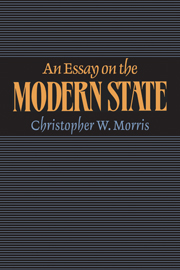10 - States: Pretenses, powers, prospects
Published online by Cambridge University Press: 05 June 2012
Summary
This treatise, therefore, in so far as it deals with political science, shall be nothing other than an attempt to comprehend and portray the state as an inherently rational entity.
–HegelStates, I have said, are complex and distinctive territorial forms of political organization, characteristic of modernity, that claim sovereignty over their realms and independence from other states. My initial analysis was that they are to be understood in terms of a number of interrelated features:
Continuity in time and space. The institutions of the state endure over time, surviving changes in leadership, and governing a definite and distinct territory.
Transcendence. The state constitutes a unitary public order distinct from, and superior to, both ruled and rulers, one capable of agency.
Political organization. The institutions through which the state acts (e.g., the government, the judiciary, the bureaucracy, the police) are differentiated from other political organizations and associations, are formally coordinated one with another, and are relatively centralized. Relations of authority are hierarchical. Rule is direct and territorial; it is relatively pervasive and penetrates society legally and administratively.
Authority. The state is sovereign, that is, the ultimate source of political authority in its territory, and it claims a monopoly of the use of legitimate force within its territory. Its jurisdiction extends directly to all residents of that territory. In its relations to other public orders, the state is autonomous.
[…]
- Type
- Chapter
- Information
- An Essay on the Modern State , pp. 288 - 298Publisher: Cambridge University PressPrint publication year: 1998



